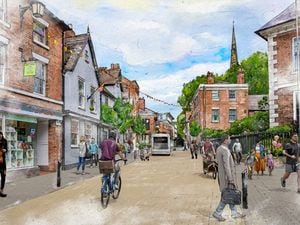Oswestry Town Council warning on tough future
Dire warning of future financial pressures have been made by Oswestry Town Council as it looks to set its budget for the coming year.

The next 12 months could prove to be critical, the town clerk has said, with the future of Britain's high streets key to the financial security of the council.
Councillors will meet on Monday to decide whether its precept on the council tax should rise by three per cent or five percent.
In the current tax year Band D tax payers have received a bill for £74.24 on top of their Shropshire council rate. A three per cent increase would see that rise to £76.54 and a five per cent increase to £78.06.
The council owns several prime site buildings in the town centre which bring in annual rent from retailers.
In his report to the finance committee, Mr David Preston, says that there are a number of significant areas of risk against income.
These include the existing rents achieved by the council and potential re-valuation, recognising the decline in retail and high street.
That decline could also affect the town's markets and also the income the council has from the car parks it operates, Mr Preston says.
Problems
Ageing properties and maintenance needs will also have to be taken into consideration.
The report also points out the problems facing unitary authorities and their potential impact.
"The estimates are set against a fast-changing, local government world within the county," Mr Preston said.
"Shropshire Council remains under financial pressure due to government settlements and in many ways local government services are now being structured with the responsibility for funding people's services that of the principal council and place and public realm services being delivered at local level by the town council."
"New income streams are required, particularly as the council has become more diverse in its functions and service delivery and more responsibility is being targeted toward the local level from both government and the unitary tier.
"The key threat is that many discretionary services will undoubtedly stop being delivered by principal councils and the onus and pressure will then be directed at parish and town councils to meet that gap in service."
However he says the budget shows how active the town council is, day to day providing parks, open spaces and the cemetery.
"This also includes town centre activities including floral planters, Christmas lights, markets, car parking, events and other service delivery that affects the quality of life of local residents and visitors and makes the town attractive as a retail and tourism centre."





